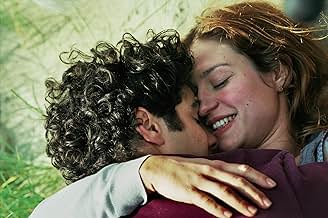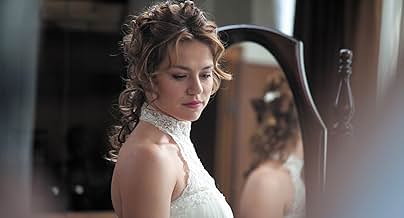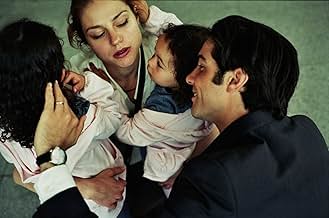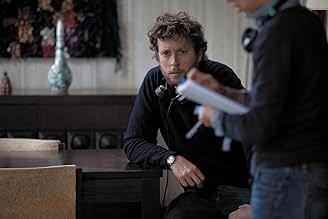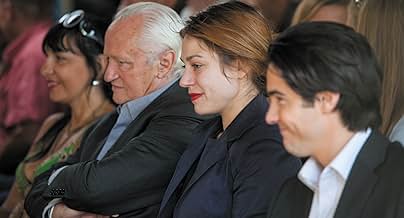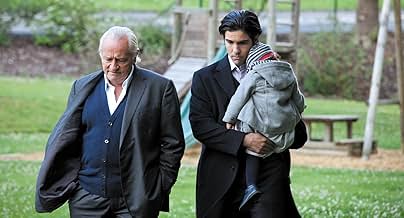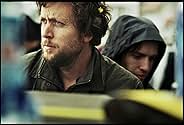IMDb RATING
6.8/10
3.2K
YOUR RATING
Happy couple, will marry and have children under the roof of the benevolent Doctor. Little by little, relationships become complex, suffocating the couple and the family, who are unaware of ... Read allHappy couple, will marry and have children under the roof of the benevolent Doctor. Little by little, relationships become complex, suffocating the couple and the family, who are unaware of the tragic end towards which they are headingHappy couple, will marry and have children under the roof of the benevolent Doctor. Little by little, relationships become complex, suffocating the couple and the family, who are unaware of the tragic end towards which they are heading
- Director
- Writers
- Stars
- Awards
- 9 wins & 12 nominations total
- Director
- Writers
- All cast & crew
- Production, box office & more at IMDbPro
Featured reviews
The film is directly inspired by the case of Geneviève Lhermitte, a Belgian woman who, in 2008, brutally murdered her five children.
What in the world drove this hitherto model mother to such a barbarous act... is the anguished question asked by writer-director Joachim Lafosse (also Belgian) in this intense if somewhat restrained drama. A question all the harder to answer when the deplorable "heroine" of this family tragedy was at a loss, as she put it, "to understand what has happened, for I still haven't understood. I acted the opposite way to what I thought."
Lafosse cannot provide THE answer, it goes without saying. How could he since the real-life murderess in person proved unable to understand herself? But he tries hard to come as close to the truth as possible. In any case, he refuses to condemn her. Instead, he describes thoroughly all the stages of the way of the cross she undergoes before committing her irreversible act.
Co-written with Matthieu Raynaert and Jacques Audiard's favorite screenwriter Thomas Bidegain, "A perdre la raison" indeed follows the various developments of the affair very realistically even if the names and a few details have been changed (after all this is a fiction work, not a documentary) : Geneviève has become Murielle and her husband is named Mounir instead of Bouchaib. Plus, the couple in the fiction has four children whereas they had five in the real situation. As for their evil genius, he is not Dr. Michel Schaar any longer, but Dr. André Pinget. Basically however, all the seeds of the tragedy sown in real life are present in the fiction and in it too the wild wind cannot but be reaped: once established the toxic relationships between Murielle (who craves the intimacy of a love nest), Mounir (whose gratefulness to his foster father lets him invade it) and André (who gives the couple everything but controls their lives from A to Z), the infernal machine is activated and – a constant in classic tragedy – nothing can stop it.
Such an approach will naturally be effective only if it rests on strong acting performances, which is fortunately the case here. Emilie Dequenne ("Rosetta", "La fille du RER") is deeply moving as Murielle, this Mother Courage - Mater Dolorosa turned Medea, while Tahar Rahim ("Un prophète", "Grand Central") translates to perfection Mounir's affectionate but weak temperament. As for Niels Arestrup ("Un prophète", "Diplomatie"), the formidable actor proves more menacing and terrifying than ever in the role of the couple's Nemesis hiding beneath a friendly exterior.
Quite a gripping work, "A perdre la raison" is a film experience you will find hard to forget. Both a cold analysis of a tragic news event and the sympathetic portrait of a desperate woman, it is one of the most impressive movies shown in 2012.
What in the world drove this hitherto model mother to such a barbarous act... is the anguished question asked by writer-director Joachim Lafosse (also Belgian) in this intense if somewhat restrained drama. A question all the harder to answer when the deplorable "heroine" of this family tragedy was at a loss, as she put it, "to understand what has happened, for I still haven't understood. I acted the opposite way to what I thought."
Lafosse cannot provide THE answer, it goes without saying. How could he since the real-life murderess in person proved unable to understand herself? But he tries hard to come as close to the truth as possible. In any case, he refuses to condemn her. Instead, he describes thoroughly all the stages of the way of the cross she undergoes before committing her irreversible act.
Co-written with Matthieu Raynaert and Jacques Audiard's favorite screenwriter Thomas Bidegain, "A perdre la raison" indeed follows the various developments of the affair very realistically even if the names and a few details have been changed (after all this is a fiction work, not a documentary) : Geneviève has become Murielle and her husband is named Mounir instead of Bouchaib. Plus, the couple in the fiction has four children whereas they had five in the real situation. As for their evil genius, he is not Dr. Michel Schaar any longer, but Dr. André Pinget. Basically however, all the seeds of the tragedy sown in real life are present in the fiction and in it too the wild wind cannot but be reaped: once established the toxic relationships between Murielle (who craves the intimacy of a love nest), Mounir (whose gratefulness to his foster father lets him invade it) and André (who gives the couple everything but controls their lives from A to Z), the infernal machine is activated and – a constant in classic tragedy – nothing can stop it.
Such an approach will naturally be effective only if it rests on strong acting performances, which is fortunately the case here. Emilie Dequenne ("Rosetta", "La fille du RER") is deeply moving as Murielle, this Mother Courage - Mater Dolorosa turned Medea, while Tahar Rahim ("Un prophète", "Grand Central") translates to perfection Mounir's affectionate but weak temperament. As for Niels Arestrup ("Un prophète", "Diplomatie"), the formidable actor proves more menacing and terrifying than ever in the role of the couple's Nemesis hiding beneath a friendly exterior.
Quite a gripping work, "A perdre la raison" is a film experience you will find hard to forget. Both a cold analysis of a tragic news event and the sympathetic portrait of a desperate woman, it is one of the most impressive movies shown in 2012.
What happens when a boy and girl meet from different cultures?
The excitement, the thrill, the joy of falling in LOVEz and spending life together. The dreamZ - the future plans etc.
Years go by - the babies are born, the work and life eats up the relationship The evil of time - deteriorates and suffocates everything we stood for.
This movie is about two lovers - Mounir (Tahir Rahim) a Morrocan immigrant living in Belgium and a Belgian girl Murielie (Emilie Dequence) falling in LOVEz and supported by the God-father of Mounir - Dr. Andre (Niels Arestrup) from being a catalyst in forming their LOVE-bond to blessing the couple to being with them in their honeymoon, to giving them shelter, money, food and even supporting their children.
Then what could go wrong? Murielie wanted freedom as a couple to live alone - and enjoy life, away from Dr.Andre - who uses kindness as blackmail and trap the young couple. Murielie feels suffocated and whenever she discusses with Mounir he always takes sides of Dr.Andre. Thus slowly and slowly Murielie feels isolated, disintegrated, and depressed becomes a routine housewives, bearing four beautiful children - caged and imprisoned within the burden of goodness and kindness shown by Dr.Andre.
What results in the end is so horrific and chilling that one goes aghast at the outcome.
It leaves the viewers devastated to say the least - viewing a claustrophobic tragedy destined to happen.
This superb movie is based on a true story.
It is a GREAT psychological drama of how slowly un-noticed the depression sets in through "subtle" everyday interaction of routine life and daily household chores. How a person feels isolated, neglected in a relationship, and above all how PATRIARCHY destroys completely a spirited young woman with dreams
The Director Joachim Lafosse has dealt with this very important subject with apt without taking sides and/ or blaming anyone, and left many questions unanswered.
Though in real life - when this incident happened - the society surely wanted a villain and thus was punished in the verdict.
The movie rests solely on the shoulders of Émilie Dequenne - who portrays Murielie so tenderly, graphically - showcasing her angst and silent sufferings with looks and stares. She literally makes an emphatical audience jump off their seat to extend a hand of help and hug her, give her support. It made me an instant life-long fan of Emilie Dequenne.
The remaining cast of Mounir and Dr.Andre too have played their part brilliantly. The director Joachim has extracted marvelous acting from little children.
At points it becomes unbearable to watch the movie and wants us to cry to intervene and turn the clock back.
But the real incident is history and can't be changed. GREAT work of cinema that I will surely remember for years
I would go with 7.75 out of 10 for this journey of joy to tragic despair.
The excitement, the thrill, the joy of falling in LOVEz and spending life together. The dreamZ - the future plans etc.
Years go by - the babies are born, the work and life eats up the relationship The evil of time - deteriorates and suffocates everything we stood for.
This movie is about two lovers - Mounir (Tahir Rahim) a Morrocan immigrant living in Belgium and a Belgian girl Murielie (Emilie Dequence) falling in LOVEz and supported by the God-father of Mounir - Dr. Andre (Niels Arestrup) from being a catalyst in forming their LOVE-bond to blessing the couple to being with them in their honeymoon, to giving them shelter, money, food and even supporting their children.
Then what could go wrong? Murielie wanted freedom as a couple to live alone - and enjoy life, away from Dr.Andre - who uses kindness as blackmail and trap the young couple. Murielie feels suffocated and whenever she discusses with Mounir he always takes sides of Dr.Andre. Thus slowly and slowly Murielie feels isolated, disintegrated, and depressed becomes a routine housewives, bearing four beautiful children - caged and imprisoned within the burden of goodness and kindness shown by Dr.Andre.
What results in the end is so horrific and chilling that one goes aghast at the outcome.
It leaves the viewers devastated to say the least - viewing a claustrophobic tragedy destined to happen.
This superb movie is based on a true story.
It is a GREAT psychological drama of how slowly un-noticed the depression sets in through "subtle" everyday interaction of routine life and daily household chores. How a person feels isolated, neglected in a relationship, and above all how PATRIARCHY destroys completely a spirited young woman with dreams
The Director Joachim Lafosse has dealt with this very important subject with apt without taking sides and/ or blaming anyone, and left many questions unanswered.
Though in real life - when this incident happened - the society surely wanted a villain and thus was punished in the verdict.
The movie rests solely on the shoulders of Émilie Dequenne - who portrays Murielie so tenderly, graphically - showcasing her angst and silent sufferings with looks and stares. She literally makes an emphatical audience jump off their seat to extend a hand of help and hug her, give her support. It made me an instant life-long fan of Emilie Dequenne.
The remaining cast of Mounir and Dr.Andre too have played their part brilliantly. The director Joachim has extracted marvelous acting from little children.
At points it becomes unbearable to watch the movie and wants us to cry to intervene and turn the clock back.
But the real incident is history and can't be changed. GREAT work of cinema that I will surely remember for years
I would go with 7.75 out of 10 for this journey of joy to tragic despair.
A Perdre La Raison starts badly because within the first moments, Joachim Lafosse chose to reveal the final outcome: 4 little coffins, what's more white, one quickly can connect the dots which completely annihilates the element of surprise and ruins part of the interest of the movie, which anyway remains minimal.
Indeed, we're dealing with a superficial script, that raises a lot of questions but only offers a few answers which is very frustrating. One has trouble grasping the stakes and understanding the motivations because under the guise of suggesting, the movie never gets deeper on anything. The plot is very, very limited the dramatic resources are almost nonexistent and the lack of dialogues is as heavy as the atmosphere prevailing within this distinctive family, to say the least.
The character of André, quite intriguing and very well embodied by the ageless Niels Arestrup, is the only thing to remember.
Indeed, we're dealing with a superficial script, that raises a lot of questions but only offers a few answers which is very frustrating. One has trouble grasping the stakes and understanding the motivations because under the guise of suggesting, the movie never gets deeper on anything. The plot is very, very limited the dramatic resources are almost nonexistent and the lack of dialogues is as heavy as the atmosphere prevailing within this distinctive family, to say the least.
The character of André, quite intriguing and very well embodied by the ageless Niels Arestrup, is the only thing to remember.
Depression is a terrible thing. The opening scene of 'My Children' tells us that an awful thing has happened, and the rest of the movie provides the background to the tragedy. It's a slow-paced film, and for much of its length, it feels too slow-paced for its own plot: it's not easy to see how the status quo is going to descend into tragedy within the allotted time. In the event, the end is sudden and not directly provoked: the cause is rather internal, the final snapping of its protagonist amid inner despair. Nonetheless, depression can be induced by real-world causes, and the film is actually, aside from its dramatic conclusion, an intriguing study of a subtly abusive relationship between an elderly doctor who in effect adopted a Moroccan family. In return for his generosity, he sought control, more control than any one person should have over the lives of others. Director Joachim Lafosse strangely shoots many scenes through out-of-focus doorways, a stylistic tic that I didn't quite understand; but this a powerful study nonetheless, a disturbing portrait of a family life that is superficially idyllic, but somehow not right nonetheless
The film sets out its stall very early, so we know within the first few minutes what we are about to see, but I spent ninety minutes in denial, hoping against all expectation that something would happen to change the course of the story.
The male characters are predictable without being cartoonish, but the female parts are outstanding. The Moroccan grandmother exemplifies the way the grandfather has been able to develop a God complex, critical of North African patriarchy while practicing it himself. It is the children's mother (Emilie Dequenne), though, who gives the most extraordinary performance. She is utterly compelling and places us, however unwillingly, into the position of the oppressed and abused. I am rarely a fan of child actors but Jade and Sohane could have been in a fly-on-the-wall documentary, so natural did they appear.
The end had a sense of horrific inevitability handled with the sympathetic discretion of Elvira Madigan, with the soundtrack adding to that comparison.
Staggeringly heartfelt, disturbing and painfully real. Truly devastating.
The male characters are predictable without being cartoonish, but the female parts are outstanding. The Moroccan grandmother exemplifies the way the grandfather has been able to develop a God complex, critical of North African patriarchy while practicing it himself. It is the children's mother (Emilie Dequenne), though, who gives the most extraordinary performance. She is utterly compelling and places us, however unwillingly, into the position of the oppressed and abused. I am rarely a fan of child actors but Jade and Sohane could have been in a fly-on-the-wall documentary, so natural did they appear.
The end had a sense of horrific inevitability handled with the sympathetic discretion of Elvira Madigan, with the soundtrack adding to that comparison.
Staggeringly heartfelt, disturbing and painfully real. Truly devastating.
Did you know
- TriviaThe official entry of Belgium to the Best Foreign Language Film at the 85th Academy Awards 2013.
- ConnectionsReferences Rocky III : L'Œil du tigre (1982)
- How long is Our Children?Powered by Alexa
Details
- Release date
- Countries of origin
- Official sites
- Languages
- Also known as
- Perder la razón
- Filming locations
- Dudelange, Luxembourg(town hall for the wedding ceremony)
- Production companies
- See more company credits at IMDbPro
Box office
- Gross US & Canada
- $23,203
- Opening weekend US & Canada
- $5,500
- Aug 4, 2013
- Gross worldwide
- $700,215
- Runtime1 hour 51 minutes
- Color
- Sound mix
- Aspect ratio
- 2.35 : 1
Contribute to this page
Suggest an edit or add missing content




